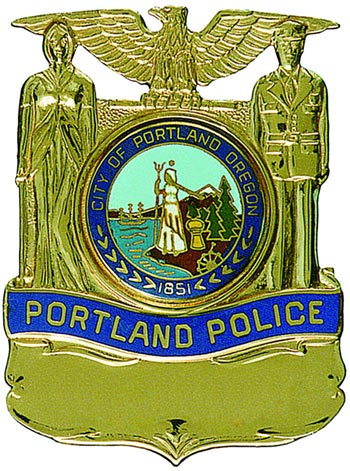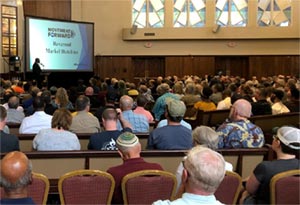Contact Us
To provide feedback on the Community Policing Dispatch, e-mail the editorial board at CPDispatch@usdoj.gov.
To obtain details on COPS Office programs, publications, and resources, contact the COPS Office Response Center at 800-421-6770 or AskCopsRC@usdoj.gov

U.S. Department of Justice
Office of Community Oriented Policing Services
Washington, DC 20530
 At 2:45 p.m. on a clear Sunday afternoon, a Ford Explorer police interceptor with no Portland Police Bureau (PPB) markings idled in a clearing adjacent to the Congregation Neveh Shalom Synagogue. The patrol vehicle was one of several visible measures implemented by the PPB to serve as a deterrent and provide a quick response in the event that the synagogue was threatened.
At 2:45 p.m. on a clear Sunday afternoon, a Ford Explorer police interceptor with no Portland Police Bureau (PPB) markings idled in a clearing adjacent to the Congregation Neveh Shalom Synagogue. The patrol vehicle was one of several visible measures implemented by the PPB to serve as a deterrent and provide a quick response in the event that the synagogue was threatened.
However, the police presence offered something more to the occupants of the numerous vehicles that began to fill the synagogue’s parking lot. You see, just the day before, what began in downtown Portland, Oregon, as a permitted march by a far-right group was quickly declared a riot and halted by police when anti-fascist counter protesters arrived and the opposing groups clashed violently. With television news stories of the violence still fresh in everyone’s mind and members of both protest groups still present throughout the city the PPB interceptor was more than just a deterrent. It was the first of many lessons that would be learned that day inside the synagogue—law enforcement and houses of worship must work together, proactively, to ensure safety.
Gathering that day at the synagogue were faith leaders and security directors from Christian, Jewish, Muslim, Buddhist, Hindu, Sikh, and other religious traditions throughout the greater Portland area. They were there to take part in an active shooter / active threat training that was being hosted by the COPS Office’s partner organization, MovementForward, and conducted by the PPB. Other contributors that participated in the training included the U.S. Attorney for the District of Oregon, Billy Williams; Special Agent in Charge of the Portland Division of the Federal Bureau of Investigation (FBI), Loren Cannon; Chief of the PPB, Danielle Outlaw; representatives from the Oregon State Police; and sheriffs from neighboring Washington, Multnomah and Clackamas Counties.
 MovementForward arranged the training as part of its ongoing effort to increase public safety and enhance cooperation between police and communities by engaging them in problem-solving collaborations that are spearheaded by religious institutions in cities throughout the country. The Portland training on active shootings at houses of worship represented a slightly different focus than many of MovementForward’s other initiatives. However, because MovementForward was already working with both police and religious leaders in the city to create stronger partnerships around public safety concerns, and the need for such a training existed, the group stepped into the void and worked with local officials to bring law enforcement and religious leaders together.
MovementForward arranged the training as part of its ongoing effort to increase public safety and enhance cooperation between police and communities by engaging them in problem-solving collaborations that are spearheaded by religious institutions in cities throughout the country. The Portland training on active shootings at houses of worship represented a slightly different focus than many of MovementForward’s other initiatives. However, because MovementForward was already working with both police and religious leaders in the city to create stronger partnerships around public safety concerns, and the need for such a training existed, the group stepped into the void and worked with local officials to bring law enforcement and religious leaders together.
“We live in an environment where those who intend to inflict harm often see large gatherings—including [religious] services—as a vulnerable target that when attacked, can wreak havoc on a mass of people and at the same time garner those attackers a great deal of media attention,” said Reverend Markel Hutchins, chairman and CEO of MovementForward.
 So sincere was interest in the topic that efforts by the trainer to hold questions until logical intervals in the instruction were all but abandoned. The approximately 700 trainees who filled Nevah Shalom took in the information they heard, whispered to one another about their observations during the training, and were quick to ask questions of the trainer. “What criminal and civil liability will be faced if an armed parishioner engages a shooter, and what are the advantages or disadvantages of having armed security at our church?” “If a shooter were to enter the room we are in right now, what would be our best response?” “Is there a typical profile for a church shooter?” “I think my mosque is safe, but how would I know what improvements to make?”
So sincere was interest in the topic that efforts by the trainer to hold questions until logical intervals in the instruction were all but abandoned. The approximately 700 trainees who filled Nevah Shalom took in the information they heard, whispered to one another about their observations during the training, and were quick to ask questions of the trainer. “What criminal and civil liability will be faced if an armed parishioner engages a shooter, and what are the advantages or disadvantages of having armed security at our church?” “If a shooter were to enter the room we are in right now, what would be our best response?” “Is there a typical profile for a church shooter?” “I think my mosque is safe, but how would I know what improvements to make?”
Like many law enforcement agencies throughout the country, the PPB will meet with houses of worship and conduct a security walkthrough of their facilities to support efforts to make them as safe as possible. Lt. Tina Jones, the PPB’s spokesperson, said that while the bureau has provided small-scale one-on-one training sessions for individual houses of worship before, this is the first major training of its kind to happen in Portland—and one of the first in the country.
As the training concluded, it was clear that participants saw the value in it and wanted additional support. As such, the PPB agreed to share copies of their training with all who attended and committed to working with interested houses of worship to address individual concerns.
The following list includes a copy of the PPB’s training presentation and a variety of other information resources that will help houses of worship and others prepare for the type of active shooter attacks that have become a sad and familiar occurrence.
- Portland Bureau of Police – Active Shooter Response Training
- U.S. Department of Homeland Security (DHS) - Guide for Developing High-Quality Emergency Operations Plans for Houses of Worship
- DHS – Active Shooter Event Quick Reference Guide
- FBI – Making Prevention a Reality: Identifying, Assessing, and Managing the Threat of Targeted Attacks Behavioral Analysis
- FBI - Pre Attack Behaviors of Active Shooters in the United States Between 2000 and 2013
- FBI - Pre Attack Behaviors of Active Shooters in the United States Between 2000 and 2013 – Quick Reference Guide
- City of Houston – RUN. HIDE. FIGHT.© Surviving an Active Shooter Event
Subscribe to Email Updates
To sign up for monthly updates or to access your subscriber preferences, please enter your email address in the Subscribe box.






